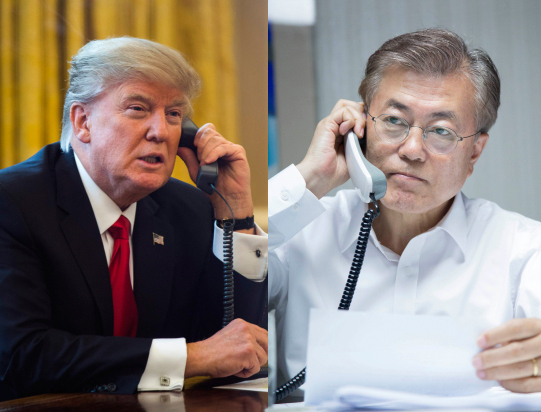President Moon Jae-in may share the common goal of North Korea’s denuclearization with President Donald Trump, but the two leaders appear to be drifting apart on their action plans to achieve that end, with Washington hardening its line in the wake of Otto Warmbier’s death.
The 22-year-old’s return home in a coma last week has stoked the wrath of the US public. His death Monday added fuel to the fire, triggering calls for tougher sanctions on Pyongyang and a travel ban for US tourists.
While continuing to pummel the Kim Jong-un regime’s brutality, Trump on Tuesday blamed China for failed efforts on the North Korea issues.

US President Donald Trump (left) and South Korean president Moon Jae-in (Yonhap)
“While I greatly appreciate the efforts of President Xi (Jinping) & China to help with North Korea, it has not worked out. At least I know China tried!” he wrote via Twitter.
This apparently reflected Washington’s intent to up the ante ahead of its diplomatic and security dialogue with China, where Susan Thornton, acting assistant secretary of state for East Asian and Pacific affairs, said North Korea would be a “top priority,” including tighter sanctions and implementation.
But others say the post may herald a shift in Trump’s North Korea strategy toward unilateral action, away from the joint pressure campaign with Beijing he had been trumpeting since his summit with Xi in April. Trump had since then repeatedly touted Xi’s leadership and personality, raising expectations -- and pressure -- for China’s role in tackling the nuclear issues.
“I have great confidence that China will properly deal with North Korea. If they are unable to do so, the US with its allies, will! U.S.A.,” he wrote on April 13, the same day the US dropped the largest non-nuclear bomb in Afghanistan.
Hours after Trump’s tweet, however, Moon was seen laying out his vision to reopen dialogue and improve ties with Pyongyang through separate interviews with the Washington Post and CBS News.
The liberal president said he believes he and Trump have a “common goal” -- the complete dismantlement of the North’s nuclear program and the denuclearization of the peninsula.
Though he expressed his willingness to join the US in putting “maximum pressure” on the wayward regime, Moon was adamant that talks are also necessary.
In the Post interview, he pledged to introduce a “two-phased approach” during next week’s summit with Trump, saying it is “urgent for us to freeze” the nuclear program before moving toward a complete disarmament. To CBS, he stressed his resolve to meet with Kim, calling it “the only way to find out” what he is thinking and saying Trump had gone “much further” than him in showing his willingness to talk to the young ruler.
The remarks are also in line with Moon’s June 15 speech marking the 17th anniversary of a landmark inter-Korean peace declaration. He said if Pyongyang halted its nuclear and missile tests, he would hold bilateral talks, and even pursue parallel negotiations on denuclearization and a peace treaty, as well as the normalization of North Korea-US relations.
However, the dynamics surrounding the summit have been evolving rapidly, in particular since the Warmbier tragedy, and it may place the two leaders on a collision course, observers say.
The White House dismissed the possibility of a meeting between Kim and Trump, which it said would only be possible under the “right conditions.”
“Clearly, we’re moving further away, not closer, to those conditions being intact. So I would not suggest that we’re moving any closer,” White House press secretary Sean Spicer said at a press briefing Tuesday.
A growing number of senior US congressmen have been raising their voices for punitive action against the Kim regime. Republican Sen. Ted Cruz on Tuesday issued a statement to share “grief and anger,” saying the regime is “mistaken if it believes that its barbaric mistreatment of an American citizen ... will pass quietly” and vowing continued work to hold it accountable. John McCain, a Republican who chairs the Senate Armed Services Committee, warned a day earlier that the US cannot “tolerate the murder of its citizens by hostile powers.”
Richard Haass, president of the Council on Foreign Relations who is known as a Trump adviser, also said at a lecture in Seoul on Tuesday that the incident would have an impact on American thinking and complicate efforts to engage in negotiations with the North.
“It seems that even if the two presidents indeed share the same goal, the interview remarks, not to mention the June 15 address, could be ill-timed at best,” a diplomatic source here said, requesting anonymity due to the sensitivity of the matter.
“Under the current atmosphere, it would be highly difficult for the US to agree to send out a conciliatory message toward the North, such as by talking about dialogue, which might make it look like it’s making concessions.”
By Shin Hyon-hee (
heeshin@heraldcorp.com)






